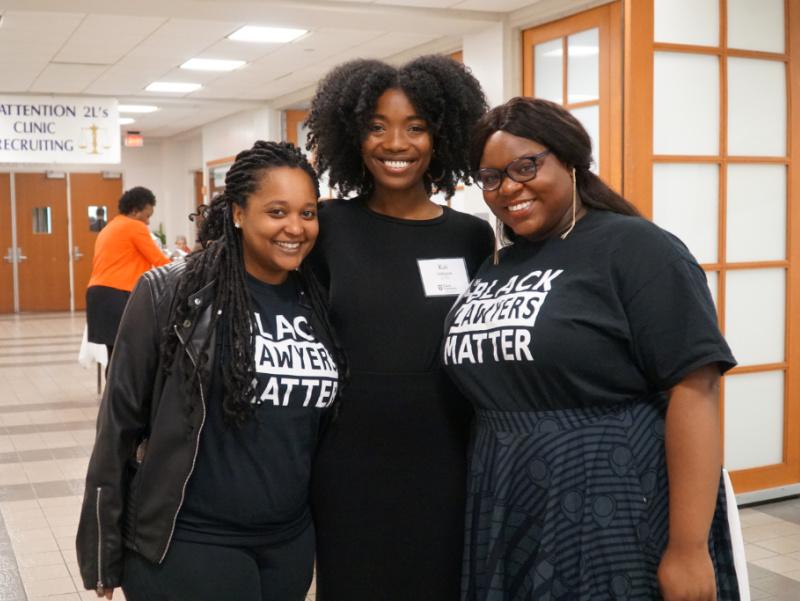Dean Meyer: Tulane Doubling Down on Diversity
Earlier this month, I spoke with former Dean Robert Clayton, who with Dean John Kramer helped lead Tulane Law School’s phenomenally successful rise in the late 1980s and 1990s to become a national leader in promoting diversity in the legal profession. Tulane then boasted the largest representation of Black law students of any law school in the country, except for Historically Black institutions. And, in our call last week, we marveled together over the inspiring leadership roles that our alumni of that era have gone on to claim -- including Congressman Cedric Richmond (L ’98), former Chair of the Congressional Black Caucus, who last month moved into the White House as a top advisor to President Biden, and Shauna Clark (L ’94), who was just elected Global Chair of Norton Rose Fulbright, one of the world’s largest law firms.
Tulane’s leadership is, of course, woefully late in coming. It was only in 2018 that we could celebrate 50 years since Tulane Law graduated its first Black student, Michael Starks (L ’68). But we took the opportunity of that milestone to recommit the Law School to recapturing the leadership position it held during the Dean Kramer era.
In recent years we have made substantial progress on multiple fronts, significantly enhancing the diversity of the student body, the faculty, the Law School’s administrative leadership team, and the Dean’s alumni advisory board. Through the recruitment of Lezlie Griffin (L ’07) as Assistant Dean for Career Development and Diversity Initiatives, we have greatly bolstered recruitment and support of diverse students. And, galvanized by our inaugural Black Law Alumni Weekend, which drew 300 alumni and friends back to campus two years ago this month, our Black alumni are now playing integral leadership roles in supporting our current students.
This past summer, in the wake of the murder of George Floyd and the national reckoning with systemic racism, we redoubled our commitment to identify and uproot continuing inequities in our own community and to think creatively about how Tulane Law School can better prepare future generations of lawyers for leadership in dismantling racial injustice beyond our campus and indeed around the world. We formed an Anti-Racism Task Force last June, co-chaired by Professor Robert Westley and with faculty, staff, student and alumni participation, to recommend possible changes to make the Law School more inclusive and to enhance the way we prepare students for leadership in promoting racial justice.
While that work is ongoing, we have made important early strides. Last fall, Professor Westley teamed up with Professor Stacy Seicshnaydre (L ’92), the Law School’s Assistant Dean for Experiential Learning and one of the nation’s foremost experts on fair housing and civil rights, to offer a special course on Anti-Racism Lawyering, featuring guest appearances by many Tulane Law alumni who are themselves leaders at the frontier of equal justice work.
We also successfully recruited Professor Maybell Romero, an accomplished and highly regarded scholar focusing on inequalities in the criminal justice system, who will become the first Latina full-time member of our faculty this summer.
And our current students show every sign of continuing in the impressive footsteps of Cedric Richmond, Shauna Clark, Michael Starks, and so many other alumni of the past 50 years. Last month, our BLSA Moot Court Team won regional best-oralist honors and earned the right to advance to BLSA’s National Rounds. Just this month, 2L Antonio Milton was elected to lead the Tulane Law Review, becoming the Review’s first Black Editor-in-Chief.
And the outlook for continued progress is strong. While applications to Tulane Law School are presently up more than 40%, applications from African-American prospective students are up an astonishing 160% from last year!
We have much work ahead of us to be the institution and the national leader we want to be, but thanks to the visionary leadership of Dean Kramer and so many of our alumni and faculty over the past 50 years, we have a unique opportunity to lead in making a more inclusive profession and a more just society. I invite you to join with us in making Tulane Law School a model for the nation in the 50 years to come.
And please mark your calendars to return to campus for Tulane Law’s Second Triennial Black Law Alumni Weekend on February 11-13, 2022!
David D. Meyer
Dean and Mitchell Franklin Professor of Law
Tulane University Law School

